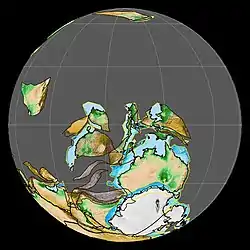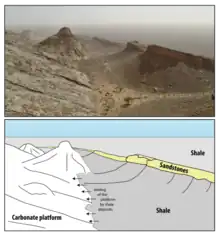| Emsian | |||||||||||||||||
|---|---|---|---|---|---|---|---|---|---|---|---|---|---|---|---|---|---|
 Paleogeography of the Emsian, 400 Ma | |||||||||||||||||
| Chronology | |||||||||||||||||
| |||||||||||||||||
| Etymology | |||||||||||||||||
| Name formality | Formal | ||||||||||||||||
| Name ratified | 1985 | ||||||||||||||||
| Usage information | |||||||||||||||||
| Celestial body | Earth | ||||||||||||||||
| Regional usage | Global (ICS) | ||||||||||||||||
| Time scale(s) used | ICS Time Scale | ||||||||||||||||
| Definition | |||||||||||||||||
| Chronological unit | Age | ||||||||||||||||
| Stratigraphic unit | Stage | ||||||||||||||||
| Time span formality | Formal | ||||||||||||||||
| Lower boundary definition | FAD of the conodont Polygnathus kitabicus | ||||||||||||||||
| Lower boundary GSSP | Zinzil'ban Gorge, Uzbekistan 39°12′00″N 67°18′20″E / 39.2000°N 67.3056°E | ||||||||||||||||
| Lower GSSP ratified | 1995[5] | ||||||||||||||||
| Upper boundary definition | FAD of the conodont Polygnathus costatus partitus | ||||||||||||||||
| Upper boundary GSSP | Wetteldorf Richtschnitt section, Wetteldorf, Eifel, Germany 50°08′59″N 6°28′18″E / 50.1496°N 6.4716°E | ||||||||||||||||
| Upper GSSP ratified | 1985[6] | ||||||||||||||||
The Emsian is one of three faunal stages in the Early Devonian Epoch. It lasted from 407.6 ± 2.6 million years ago to 393.3 ± 1.2 million years ago. It was preceded by the Pragian Stage and followed by the Eifelian Stage. It is named after the Ems river in Germany.[7] The GSSP is located in the Zinzil'ban Gorge in the Kitab State Geological Reserve of Uzbekistan, 35 centimetres (14 in) above the contact with the Madmon Formation.
In North America the Emsian Stage is represented by Sawkill or Sawkillian time.
Biological events

During this period, earliest known agoniatitid ammonoid fossils began appearing within this stage after first appearing in previous stage and began to evolutionarily radiate within this stage, in which a new ammonoid order Goniatitida rises in the end of Zlichovian stage (Siberian representation; corresponds to early Eifelian and after the end of Early Devonian, before 391.9 mya).[8][9] Later agoniatitid ammonoids would die out in the Taghanic event in the upper middle Givetian. Goniatite ammonoids would give rise to further ammonoid orders, thus starting ammonoid dominance of marine fossils in further periods until their end at the Cretaceous-Paleogene mass extinction event.
References
- ↑ Parry, S. F.; Noble, S. R.; Crowley, Q. G.; Wellman, C. H. (2011). "A high-precision U–Pb age constraint on the Rhynie Chert Konservat-Lagerstätte: time scale and other implications". Journal of the Geological Society. London: Geological Society. 168 (4): 863–872. doi:10.1144/0016-76492010-043.
- ↑ Kaufmann, B.; Trapp, E.; Mezger, K. (2004). "The numerical age of the Upper Frasnian (Upper Devonian) Kellwasser horizons: A new U-Pb zircon date from Steinbruch Schmidt(Kellerwald, Germany)". The Journal of Geology. 112 (4): 495–501. Bibcode:2004JG....112..495K. doi:10.1086/421077.
- ↑ Algeo, T. J. (1998). "Terrestrial-marine teleconnections in the Devonian: links between the evolution of land plants, weathering processes, and marine anoxic events". Philosophical Transactions of the Royal Society B: Biological Sciences. 353 (1365): 113–130. doi:10.1098/rstb.1998.0195.
- ↑ "Chart/Time Scale". www.stratigraphy.org. International Commission on Stratigraphy.
- ↑ Yolkin, E.; Kim, A.; Weddige, K.; Talent, J.; House, M. (December 1997). "Definition of the Pragian/Emsian Stage boundary". Episodes. 20 (4): 235–240. doi:10.18814/epiiugs/1997/v20i4/005. Retrieved 18 December 2020.
- ↑ Ziegler, W.; Klapper, G. (June 1985). "Stages of the Devonian System" (PDF). Episodes. 8 (2): 104–109. doi:10.18814/epiiugs/1985/v8i2/006. Retrieved 18 December 2020.
- ↑ "Emsian stage". Encyclopedia Britannica. Retrieved 2 October 2019.
- ↑ Klug, Christian (July 30, 1999). "Early Emsian ammonoids from the eastern Anti-Atlas (Morocco) and their succession". Paläontologische Zeitschrift. 74 (4): 479–515. doi:10.1007/BF02988158.
- ↑ Chlupac, I.; Lukes, P. (January 1999). "Pragian/Zlichovian and Zlichovian/Dalejan boundary sections in the Lower Devonian of the Barrandian Area, Czech Republic". ResearchGate. Retrieved June 26, 2018.